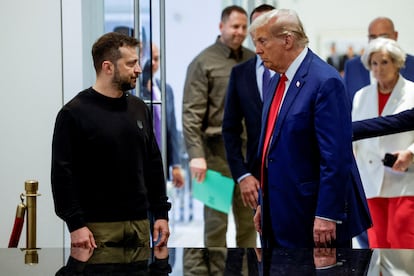Zelenskiy launches diplomatic offensive to convince Trump to maintain support for Ukraine
The Ukrainian leader will focus his administration on gaining the trust of the American president-elect, who opposes U.S. aid to the country

Kyiv has launched a diplomatic offensive to convince Donald Trump that U.S. military aid to Ukraine is critical, not just for Ukraine’s survival, but for America’s global leadership. As Ukrainian President Volodymyr Zelenskiy has repeatedly stated, without U.S. support, Ukraine is doomed. Trump, however, said during his campaign that his presidency would end the multi-billion dollar arms supply to Ukraine and focus instead on quickly securing an end to the war as soon as possible — even if that means ceding occupied territories to Russia.
Zelenskiy is now leading a campaign to sway Trump, believing that Trump’s rhetoric as a candidate is one thing, and what he does as president is another. Sources from the Ukrainian president’s office confirmed to EL PAÍS that Zelenskiy’s agenda in the coming weeks is to win over Trump before he assumes office in January. On Wednesday, Zelenskiy was among the first world leaders to congratulate Trump on his victory, expressing his excitement with an almost exuberant message: “Congratulations on this impressive election victory!” he posted on the social platform X. “We look forward to an era of a strong United States under the decisive leadership of President Trump.”
On Thursday morning, Trump and Zelenskiy held a phone conversation, which the Ukrainian president described in glowing terms. “I had an excellent call with President Trump and congratulated him on his historic landslide victory — his tremendous campaign made this result possible. I praised his family and team for their great work,” said Zelenskiy.
This tone stands in sharp contrast to the repeated mockery Trump directed at Zelenskiy during his presidential campaign. When the Ukrainian leader visited Washington last September, Trump called him “the greatest salesman on Earth.” “Every time Zelenskiy comes to the United States, he walks away with $100 billion,” Trump joked. “But we’re stuck in that war unless I’m president.” At rallies and in interviews throughout October, Trump continued to insist that Zelenskiy was partly to blame for the war: “He should never have let that war start.”
Zelenskiy’s top aide, Andriy Yermak, also shared positive reflections on his meeting with Trump in New York last September. During the event, Trump said he had “very good relations” with both Zelenskiy and Russian President Vladimir Putin, and that his goal was to bring both leaders to the negotiating table. “I hope that relations will be better with me,” Zelenskiy reportedly replied, to which Trump smiled.
Yermak also congratulated Mike Johnson on his re-election as a congressman. Johnson, now Speaker of the House, was pivotal in securing Republican support for the last major U.S. military deployment to Ukraine in April, after nearly seven months of political gridlock. However, Johnson refused to meet with Zelenskiy during his Washington visit in September, accusing the Ukrainian president of campaigning for the Democrats.
In recent weeks, Zelenskiy has stressed his belief that there is a difference between what is said during an election campaign, and what actions are taken in office. On Wednesday, Mikhail Podolyak, a key member of Zelenskiy’s office, wrote on X that Trump may be keen to stand up to countries that challenge U.S. power: “Perhaps this is the perfect time to finally punish the outcasts, provocateurs and leaders of destructive alliances who have challenged the global leadership of the United States.” However, the challenge for Ukraine is that Trump’s focus remains largely on domestic politics.
Legacy of Ronald Reagan
On Wednesday evening, Zelenskiy invoked former U.S. president Ronald Reagan in his daily address, emphasizing the fight “for a life free from Russian aggression.” This call echoed remarks made earlier in the day by Wolfgang Ischinger, the German diplomat and president of the Munich Security Conference, who highlighted that Trump seeks agreements but likely none that would undermine his image as a strong strategist. “Who else was the first to supply weapons to Ukraine?” Ischinger asked, referencing the Trump administration’s 2019 decision to send portable anti-armor missiles to Ukraine during its war against pro-Russian separatists in Donbas — an action not taken by the Obama administration.
Dan Rice, president of the American University of Kyiv, a former U.S. military officer, and former advisor to Ukrainian Armed Forces Commander-in-Chief Valerii Zaluzhnyi, explained to EL PAÍS on Thursday that Zelenskiy’s strategy to win over Trump will focus on invoking the legacy of Reagan. “Trump can be the leader of the free world, just as Reagan was against the Soviet Union. One thing is what is said during a campaign for a national audience, and another is the international legacy that determines an American president’s place in history. And Trump is no exception. For better or worse, his legacy will be marked by Ukraine.”
Zelenskiy’s congratulatory message to Trump emphasized his belief that bilateral relations could be mutually beneficial and that their common interests outweighed their differences. “I appreciate President Trump’s commitment to the ‘peace through strength’ approach in global affairs. This is exactly the principle that can practically bring just peace in Ukraine closer. I am hopeful that we will put it into action together,” Zelenskiy wrote on X.
“I’m not going to start wars, I’m going to stop wars,” Trump declared in his victory speech. On Thursday, The Wall Street Journal reported that Trump’s advisors were considering ways to freeze the conflict rather than achieve a lasting peace. “Trump promised during his campaign that he would end the war in a few days, now we will see if it is possible,” Vasyl Khmelnytsky, a former MP and one of Ukraine’s wealthiest people, told EL PAÍS on Thursday.
Khmelnytsky made his comments during the Kyiv Economic Forum, which brought together some of the country’s largest companies and political leaders. Trump’s victory was a key topic of discussion, particularly regarding its potential impact on ending the conflict in 2025, as Zelenskiy hopes. “Now we will see if he can fulfill what he said he could do,” Khmelnitsky said. “We know it won’t be an ideal solution for Ukraine, but it has to come with at least some good conditions for our country.”
Sign up for our weekly newsletter to get more English-language news coverage from EL PAÍS USA Edition
Tu suscripción se está usando en otro dispositivo
¿Quieres añadir otro usuario a tu suscripción?
Si continúas leyendo en este dispositivo, no se podrá leer en el otro.
FlechaTu suscripción se está usando en otro dispositivo y solo puedes acceder a EL PAÍS desde un dispositivo a la vez.
Si quieres compartir tu cuenta, cambia tu suscripción a la modalidad Premium, así podrás añadir otro usuario. Cada uno accederá con su propia cuenta de email, lo que os permitirá personalizar vuestra experiencia en EL PAÍS.
¿Tienes una suscripción de empresa? Accede aquí para contratar más cuentas.
En el caso de no saber quién está usando tu cuenta, te recomendamos cambiar tu contraseña aquí.
Si decides continuar compartiendo tu cuenta, este mensaje se mostrará en tu dispositivo y en el de la otra persona que está usando tu cuenta de forma indefinida, afectando a tu experiencia de lectura. Puedes consultar aquí los términos y condiciones de la suscripción digital.









































